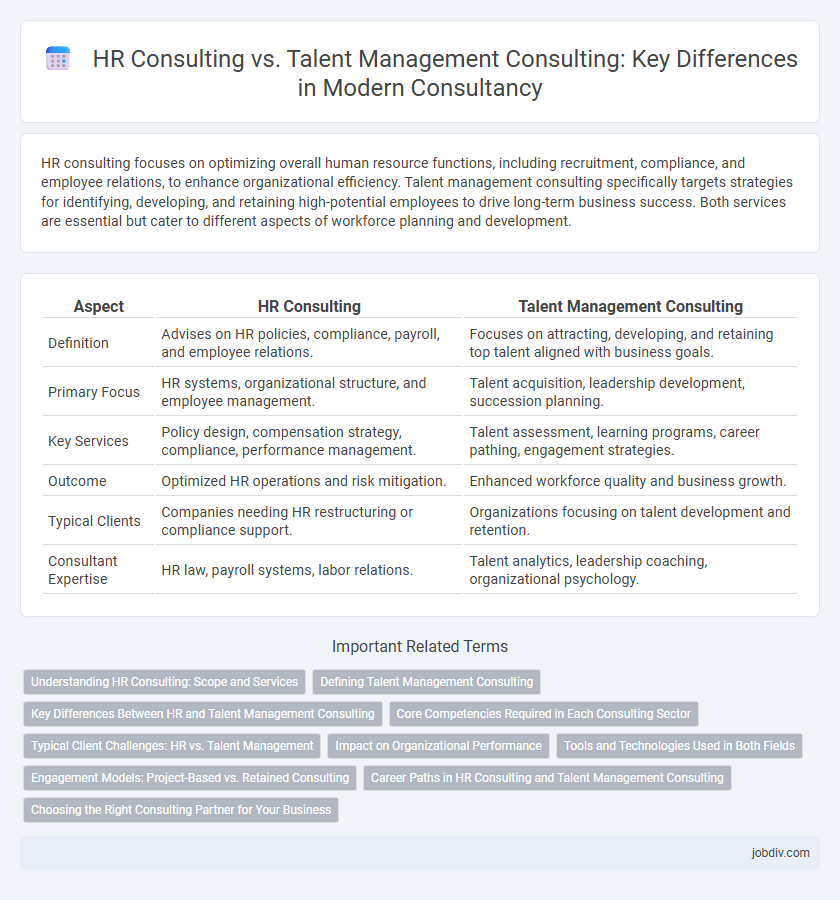HR consulting focuses on optimizing overall human resource functions, including recruitment, compliance, and employee relations, to enhance organizational efficiency. Talent management consulting specifically targets strategies for identifying, developing, and retaining high-potential employees to drive long-term business success. Both services are essential but cater to different aspects of workforce planning and development.
Table of Comparison
| Aspect | HR Consulting | Talent Management Consulting |
|---|---|---|
| Definition | Advises on HR policies, compliance, payroll, and employee relations. | Focuses on attracting, developing, and retaining top talent aligned with business goals. |
| Primary Focus | HR systems, organizational structure, and employee management. | Talent acquisition, leadership development, succession planning. |
| Key Services | Policy design, compensation strategy, compliance, performance management. | Talent assessment, learning programs, career pathing, engagement strategies. |
| Outcome | Optimized HR operations and risk mitigation. | Enhanced workforce quality and business growth. |
| Typical Clients | Companies needing HR restructuring or compliance support. | Organizations focusing on talent development and retention. |
| Consultant Expertise | HR law, payroll systems, labor relations. | Talent analytics, leadership coaching, organizational psychology. |
Understanding HR Consulting: Scope and Services
HR consulting encompasses a broad range of services designed to optimize workforce strategy, including organizational development, compliance, performance management, and employee relations. It focuses on aligning HR policies with business goals to improve overall operational efficiency and employee satisfaction. Talent management consulting specifically targets recruitment, talent acquisition, succession planning, and leadership development to build and retain high-performing teams.
Defining Talent Management Consulting
Talent Management Consulting focuses on optimizing the entire employee lifecycle, including recruitment, development, retention, and succession planning, to align talent strategies with organizational goals. It emphasizes strategic workforce planning, employee engagement, performance management, and leadership development to maximize human capital value. Unlike broader HR Consulting, Talent Management Consulting zeroes in on fostering high-potential talent and building a sustainable competitive advantage through targeted talent initiatives.
Key Differences Between HR and Talent Management Consulting
HR Consulting primarily focuses on improving overall organizational HR policies, compliance, and employee relations, ensuring alignment with labor laws and internal regulations. Talent Management Consulting centers on strategic recruitment, skill development, succession planning, and performance management to maximize workforce potential. Key differences include HR Consulting's emphasis on policy frameworks and operational efficiency, while Talent Management Consulting prioritizes talent acquisition, employee growth, and retention strategies.
Core Competencies Required in Each Consulting Sector
HR consulting demands expertise in organizational design, labor law compliance, and employee relations to optimize workforce efficiency and ensure regulatory adherence. Talent management consulting requires deep knowledge of talent acquisition strategies, leadership development, and performance management systems to enhance employee capabilities and retention. Both sectors rely on strong communication, data analysis skills, and strategic planning but target distinct organizational challenges.
Typical Client Challenges: HR vs. Talent Management
HR Consulting clients often face challenges related to compliance with employment laws, employee relations, and organizational structure optimization. Talent Management Consulting clients typically struggle with succession planning, leadership development, and enhancing employee engagement to retain high-potential talent. Both require strategic approaches, but HR Consulting emphasizes operational efficiency while Talent Management Consulting focuses on long-term workforce growth.
Impact on Organizational Performance
HR consulting enhances organizational performance by streamlining human resource processes, improving compliance, and optimizing workforce planning to reduce costs and increase efficiency. Talent management consulting drives higher impact by aligning talent acquisition, development, and retention strategies with business goals, fostering leadership growth, and enhancing employee engagement for sustained competitive advantage. Both approaches contribute to organizational success, but talent management consulting directly influences employee productivity and innovation, leading to measurable improvements in performance metrics.
Tools and Technologies Used in Both Fields
HR consulting employs robust Human Resource Information Systems (HRIS) like Workday and SAP SuccessFactors to streamline employee data management, payroll, and compliance tracking. Talent management consulting leverages advanced talent acquisition platforms such as LinkedIn Talent Insights and AI-driven assessment tools like HireVue for optimized recruitment, performance evaluation, and succession planning. Both fields integrate analytics dashboards and cloud-based collaboration software to enhance strategic decision-making and workforce planning.
Engagement Models: Project-Based vs. Retained Consulting
HR consulting engagement models vary between project-based approaches, offering defined deliverables and timelines, and retained consulting, emphasizing continuous support and strategic alignment. Talent management consulting often favors retained models to ensure ongoing optimization of recruitment, development, and retention strategies. Project-based engagements suit specific HR initiatives like policy development, whereas retained contracts drive sustained organizational performance and workforce engagement.
Career Paths in HR Consulting and Talent Management Consulting
Career paths in HR consulting often focus on broad organizational development, employee relations, compliance, and workforce strategy, providing expertise that enhances overall human resource functions. Talent management consulting specializes in optimizing recruitment, retention, employee engagement, and leadership development to align talent strategies with business goals. Professionals in HR consulting typically advance toward roles such as HR directors or organizational development consultants, while talent management consultants progress into positions like talent acquisition leaders or succession planners, reflecting their distinct strategic focuses.
Choosing the Right Consulting Partner for Your Business
Selecting the right consulting partner involves understanding the strategic differences between HR consulting, which focuses on optimizing human resource functions like payroll, compliance, and workforce policies, and talent management consulting, which prioritizes recruitment, employee development, and retention strategies. Businesses seeking to improve operational efficiency benefit from HR consultants, while organizations aiming to enhance workforce capabilities and leadership pipelines gain more from talent management consultants. Evaluating specific company goals, industry challenges, and long-term talent needs ensures alignment with the consultant's expertise, driving measurable organizational growth.
HR Consulting vs Talent Management Consulting Infographic

 jobdiv.com
jobdiv.com